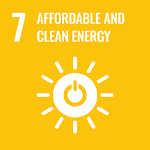About Affordable and Clean Energy
Ensure access to affordable, reliable, sustainable and modern energy for all.

We work towards the UN's Sustainable Development Goal 7 - Affordable and Clean Energy , to create a better and fairer world.
The 2030 Agenda for Sustainable Development was adopted in 2015 by all United Nations member states. It provides a blueprint for peace and prosperity for people and the planet.
Find out more about our work across all the UN's Sustainable Development Goals.
Ensure access to affordable, reliable, sustainable and modern energy for all.

Bringing Scotland’s water sector together to drive us to net zero and beyond. The Scotland Hydro Nation Chair, hosted by the University of Stirling, is leading the collaboration needed to deliver sustainable water management in Scotland. The project is working across the Scottish water sector and its supply chain to eliminate emissions from infrastructure development and waste water processing, promote our natural environment and manage our processes better, allowing us to recover resource including energy to contribute to a greener, more circular economy.
The initiative is a partnership involving Scottish Water and the Scottish Funding Council.
Research and teaching on environmental and energy law and policy is a core area of expertise at the University of Stirling. We work across the natural and the social sciences and in the context of Scotland’s International Environment Centre - which was established as part of the Stirling and Clackmannanshire City Region Deal - to provide an interdisciplinary perspective on the challenges associated with environmental and energy governance. Our staff are engaged in world leading, rigorous, high impact policy-orientated research on climate change law, renewable energy governance, environmental rights, and the enforcement of environmental law.
Our staff have worked with NGOs, parliaments, international and regional institutions, on the key environmental issues of our time. For example, our research informs the work of the newly established body for the enforcement of environmental law in Scotland, Environmental Standards Scotland (ESS).
Political Economy and the Global Environment is an optional module that is regularly offered to all third and fourth year students in single and combined Politics, International Politics, and Politics, Philosophy and Education (PPE) courses.
Low carbon and affordable energy is a cross-cutting empirical theme throughout the module, exploring particular themes (such as economic growth, global trade, foreign direct investment, sustainable consumption) and potential policy solutions by considering environmental/climate goals alongside affordability, equity, and economic efficiency.
Moreover, one seminar is specially devoted to investigating the global energy/climate challenge. Students work in small groups to discuss and present what they deem to be the most compelling vision for global energy decarbonisation.
Overall, the module aligns with the global sustainable development agenda by addressing the global energy transition as an interconnected set of environmental, social, and economic objectives.
The University offers an LLM Environmental Law and Climate Justice. The main focus of this course is how the growing pressure on natural resources has prompted a re-evaluation of traditional approaches to addressing the challenges and seeking opportunities, including mitigating climate change, halting and restoring biodiversity and habitat loss, sustainable development and replacing conventional forms of energy (oil, gas, coal), as well as a search for new and renewable ones via energy transition.
The Net Zero Business Support programme works in partnership with external organisations to deliver one-to-one and one-to-many interventions that educate and inspire climate action. Beginning in 2024, funded through UK Shared Prosperity Funding leveraged through Stirling Council, the programme supports the region in building capacity for carbon reduction planning.
The programme consists of a cohort of six Net Zero Business Support Interns, from undergraduate, postgraduate and recent graduate backgrounds and takes them through an intensive six-week programme of training to upskill and build confidence in using industry recognised tools to develop carbon reduction plans. Once the training is complete, each intern is assigned to a business to provide one-to-one support, develop a plan and add staffing capacity as a sustainability support officer for a minimum of four and maximum of eight weeks.
The project helps to bridge academia with the wider local business landscape as well as providing joint benefit for students and SMEs.
Scotland’s International Environment Centre (SIEC) - which was established as part of the Stirling and Clackmannanshire City Region Deal - offers local businesses assistance in reducing their carbon impact with a net zero plan. This is not just about the urgency of tackling the climate crisis. It's also good business because net zero support can help reduce costs, access funding and ensure legal compliance. SIEC is working in partnership with the Scottish Business Climate Collaboration to deliver this free net zero training.
Our main website, stir.ac.uk, is hosted on servers powered entirely by renewable energy.
The University has installed the search engine Ecosia on laptops lent to students. Their internet searches have resulted in the planting 8,829 trees in the last year. Ecosia uses all its profits for the planet and produces enough renewable energy to power all searches twice over.
The University is a key contributor to The Regional Energy Masterplan, a joint City Region Deal project between Stirling and Clackmannanshire Councils. It outlines what we need to do to reach a net zero energy system across the region by 2045, with projects being delivered in five-year phases.
Switching our reliance on fossil fuels to renewable energy sources that produce lower or no greenhouse gas emissions is critically important in tackling the climate crisis. It will enable us to tackle fuel poverty by facilitating the provision of and helping to provide low carbon, low-cost energy for residents and businesses within the council areas.
The Beacon Project, funded by Medical Research Council (MRC), uses hydropower development as a model system and employ interdisciplinary thinking and methods to quantify the trade-offs, conflicts and synergies between SDGs and stakeholders.
The overarching aim of The Beacon Project is to identify, forecast, prevent and mitigate conflicts associated with development processes, to achieve equitable sustainable development now and beyond the 2030 sustainable development targets.